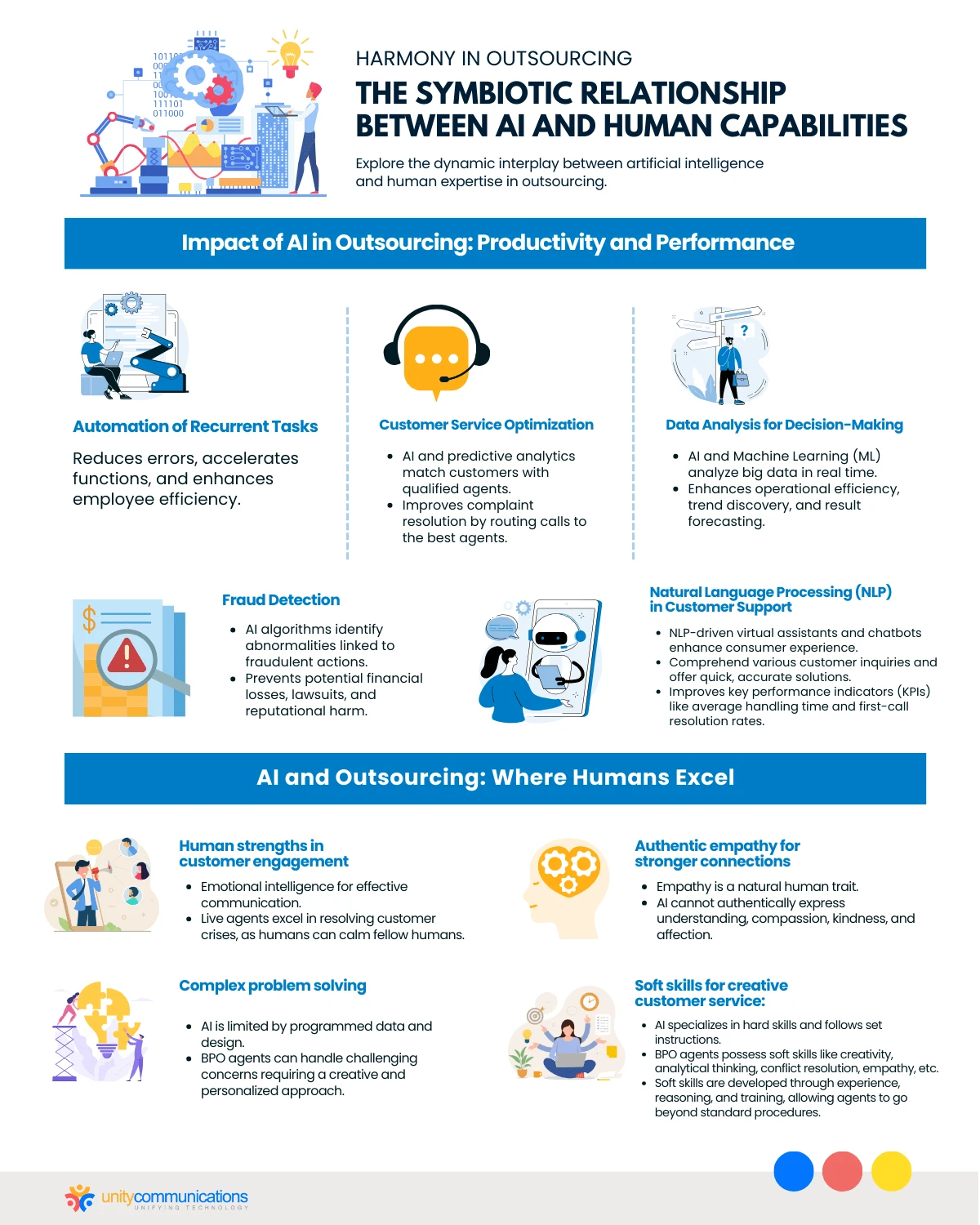Table of Contents
Many are concerned that artificial intelligence (AI) will replace millions of employees in different industries, including the business process outsourcing (BPO) sector. The technology will likely become a major job disruptor for the outsourcing business, taking over human roles and automating most operations.
AI is a technology that simulates human speech and understanding. So when discussing the capability of outsourcing and AI to change the workforce, what role will human agents play?
This article discusses how AI is used in outsourcing and describes where human workers’ functions start and end.
Keep reading to learn more.
Outsourcing and AI: Where the Human Roles End
Individual functions and activities can be limited in certain areas when integrating outsourcing and AI technology into business processes. This restriction can allow BPO employees to thrive and realize their full abilities and natural talent at work.
However, let us first examine where or how the deployment of AI across the BPO organization can replace live workers for better productivity and performance.
Automating Recurrent Tasks for Faster and More Accurate Processes
Tedious, time-consuming, and low-value processes, such as encoding large amounts of data, answering simple customer questions, and handling immense and repetitive transactions, can be automated when combining outsourcing and AI. Automation decreases errors and accelerates functions to raise employee and operational efficiency.
In particular, robotic process automation (RPA) enables AI-driven software robots to handle rule-centered and routine operations in outsourcing businesses. RPA enables live workers to spend time on more challenging, worthwhile, and higher-value duties.
Additionally, automation in the BPO industry permits service providers to focus on core competencies, including enhancing outsourcing services and strengthening customer support. Thus, utilizing an AI solution helps lower outsourcing fees while improving client service.
Providing Forecasts to Address Customer Needs
When implementing outsourcing and AI in customer service operations, it is possible to match customers with the most qualified agents to properly and promptly address their concerns. Notably, AI-powered predictive analytics can assess each customer interaction according to certain factors, such as personality traits, product or service choices, and previous attitudes.
Detailed consumer information lets agents serve customers in the best possible way. Routing calls to the best agents using predictive analytics boosts the chances of resolving complaints and issues at initial contact.
Predictive analytics also applies to supply chain management. Outsourcing companies that leverage this technology can reduce the inventory costs of their clients. Analytics allows them to analyze supplier performance, finding those likely to satisfy pricing, quality, and delivery criteria.
Enhancing Data Analysis for More Effective Decision-Making
Organizing and analyzing big data, or high and difficult-to-manage volumes of structured and unstructured data, in real time is possible when incorporating outsourcing and AI.
Artificial intelligence (AI) and machine learning (ML), the application of AI to help computer systems continue learning according to experience, can gather and evaluate data more quickly and correctly than humans. Data scientists use ML and AI tools to obtain pertinent details, enabling service providers to maximize operations, discover trends, and forecast results.
Moreover, using AI with deep learning capabilities in customer service provides BPO companies with data-based knowledge. It can evaluate consumer data and trends that reflect high or low customer experience and satisfaction. Such vital information helps customer support managers make data-driven (and thus more accurate) decisions during operations.
Detecting Fraud to Avoid Financial Losses and Reputational Harm
Potential financial consequences, lawsuits, and reputational damages due to fraudulent actions can be prevented by outsourcing and integrating AI into processes. Employees or outsiders (e.g., online hackers) can commit business fraud. Examples are credit card theft, unauthorized access to customer accounts, account takeovers, and interactive voice response (IVR) mining.
Learning algorithms can evaluate data to find abnormalities or trends linked to criminal or deceptive actions. Outsourcing firms can utilize AI-driven identification approaches to spot and avoid fraud, securing their customers’ interests and ensuring the authenticity of their business processes.
Leveraging NLP for Better Customer Support
Natural language processing (NLP) is an area of data science concerned with the interaction between computers and languages. This AI and machine learning technology allows computers to communicate with humans by understanding and interpreting their language.
Customer service outsourcing supplemented with an AI system such as NLP can assist third-party professionals in delivering a higher level of consumer experience and satisfaction. Specifically, NLP-driven virtual assistants and chatbots can comprehend various customer inquiries, allowing them to offer solutions and recommendations. As a result, they free up agents’ workload.
Since these NLP-based computer programs can reply quickly and accurately, they improve customer support and decrease agent response times. Key performance indicators (KPIs) such as average handling time (AHT) and first-call resolution rates (FCR) are also enhanced, leading to lower operating costs and higher revenue.
Outsourcing and AI: Where the Human Role Starts
Now we know what BPO’s next-generation technology, AI, is all about. Learning where it should end its role in outsourcing is equally important. Whether using external or in-house AI solutions, service providers can boost staff efficiency and output using this technology.
However, BPO providers must also learn where to start with human roles concerning this technology and how to capitalize on them to maximize outsourced operations and productivity.
Let us look at where humans excel in outsourcing and where AI falls short.
Humans Possess Emotional Intelligence for Better Customer Engagement
Although AI can mimic human speech and cognition, it cannot comprehend or use feelings to engage with consumers. The value of emotional intelligence in the workplace must be balanced, mainly when communicating with the client’s customers.
For instance, in sales support outsourcing, an AI-based tool will not be as effective as live agents in closing deals or convincing existing customers to buy more. Success in selling requires excellent persuasion, flexibility, and bargaining skills. Salespeople win over potential buyers by promoting products or services and catering to their emotions.
The same goes for a customer crisis. Live call center agents should handle irate callers to resolve complaints instead of chatbots or virtual assistants. Only humans can calm fellow humans. That is why, in the U.S., many choose to talk with live customer service personnel, based on a national survey by OnePoll.
Humans Exhibit Real Empathy for Stronger Customer Connection
Empathy, which includes understanding, compassion, kindness, and affection, is natural to any human.
Customer service agents and technical support are often involved in these types of emotions in outsourcing. AI can never authentically express these feelings toward customers as third-party professionals can. Callers will likely know whether customer assistants on the other line show genuine or false sympathy for their problems.
AI-based chatbots, virtual assistants, and other customer support tools cannot comprehend and convey customers’ emotions. In contrast, contact center or call center representatives can identify subtle hints in a customer’s speech, adjust their manner of speaking, and respond accordingly to ease or please customers.
Humans Resolve Complex Problems to Address More Customer Concerns
AI can only operate as per the data provided. The technology loses its value if the data fed into the system does not contain a new field of work or if its design fails to account for unanticipated scenarios.
So, if AI is programmed to tackle customer questions and issues needing basic answers and resolutions, that is all it can do. BPO agents, on the other hand, can deal with challenging concerns that require a creative and personalized approach. Their training and personal experience allow them to do so.
Humans Possess Soft Skills for More Creative Customer Services
BPO agents have soft skills such as:
- Creativity
- Analytical thinking
- Conflict resolution
- Empathetic listening
- Detail-oriented
- Interpersonal skills
- Teamwork
- Friendliness
- Leadership
- Work ethics
These are skills every worker in the outsourcing industry can develop, and AI cannot (at least not all of them). These skills are sought after in the BPO industry, and those who plan to build a long-term career in this space must cultivate and utilize them fully.
AI is technical by nature and specializes in hard skills. It is designed using mathematics, algorithms, and other exact sciences. It only follows sets of instructions and does not go beyond them. Soft skills are built and improved through experience, reasoning, and training. Agents with various soft skills can go the extra mile and perform workarounds.
The Bottom Line
Proper integration of outsourcing and AI in business processes minimizes the drawbacks for BPO organizations that this technology might cause and optimizes its benefits. These advantages include streamlined common tasks, enhanced data analysis, more accurate forecasting of customer expectations, and better outsourcing fraud detection.
AI and its subsectors must be used as a supplement to help BPO service providers and clients achieve their goals and needs. It must not replace humans but help generate more innovative, knowledge-intensive, higher-value jobs and opportunities.
Let’s connect to learn more about outsourcing and AI!







